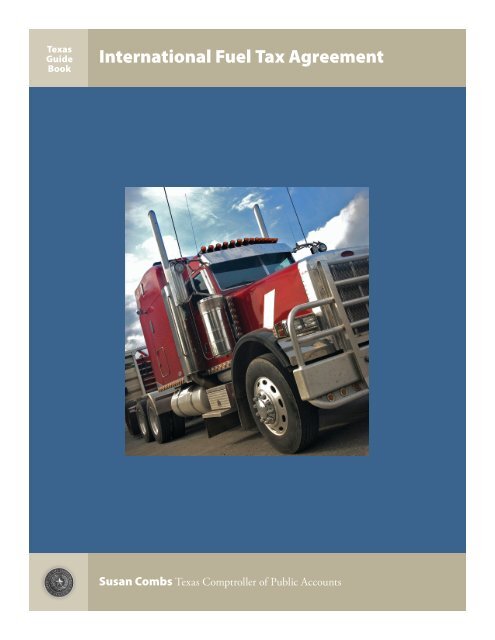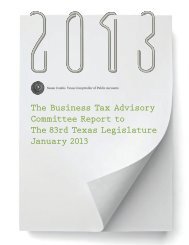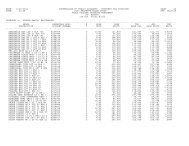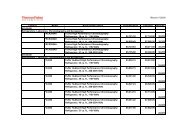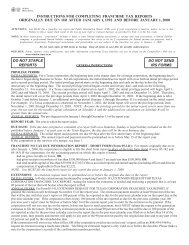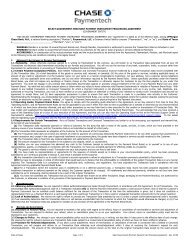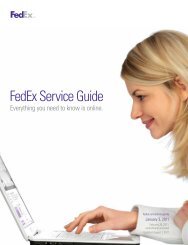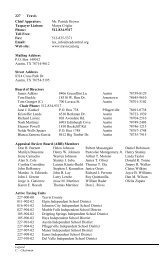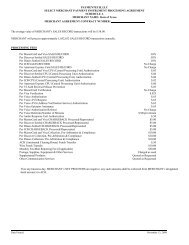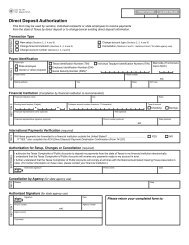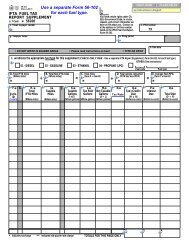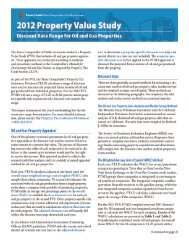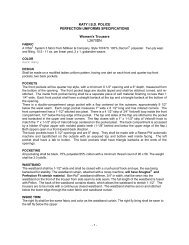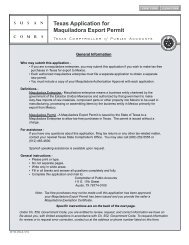International Fuel Tax Agreement - Texas Comptroller of Public ...
International Fuel Tax Agreement - Texas Comptroller of Public ...
International Fuel Tax Agreement - Texas Comptroller of Public ...
- No tags were found...
You also want an ePaper? Increase the reach of your titles
YUMPU automatically turns print PDFs into web optimized ePapers that Google loves.
<strong>Texas</strong>GuideBook<strong>International</strong> <strong>Fuel</strong> <strong>Tax</strong> <strong>Agreement</strong>Susan Combs <strong>Texas</strong> <strong>Comptroller</strong> <strong>of</strong> <strong>Public</strong> Accounts
I.IntroductionThe <strong>International</strong> <strong>Fuel</strong> <strong>Tax</strong> <strong>Agreement</strong> (IFTA) is designedto significantly reduce your compliance burdens for reportingstate/province motor fuel taxes.The IFTA governing documents (Articles <strong>of</strong> <strong>Agreement</strong>,Procedures Manual and Audit Manual) can be found onthe Internet at www.iftach.org under the heading “IFTAManuals.”This guidebook will help you with the application, licensing,reporting, record-keeping requirements and audit proceduresunder IFTA.Advantages <strong>of</strong> IFTA include:• a single fuel tax license issued by the base jurisdictionauthorizing travel in all IFTA jurisdictions;• a quarterly tax return containing detailed operationsin each <strong>of</strong> the member jurisdictions, filedonly with the base jurisdiction; and• fuel tax audits generally performed only by thebase jurisdiction.<strong>Texas</strong> is your base jurisdiction for IFTA licensing and reportingif you:• have qualified motor vehicles registered in <strong>Texas</strong>that actually travel on <strong>Texas</strong> highways;• have an established place <strong>of</strong> business in <strong>Texas</strong>from which motor carrier operations are performed;and• maintain the operational control and records forqualified motor vehicles in <strong>Texas</strong> or can makethose records available in <strong>Texas</strong>.The IFTA member jurisdictions include all 48 contiguousstates <strong>of</strong> the United States and the 10 provinces <strong>of</strong> Canada.The following jurisdictions are presently not members <strong>of</strong>IFTA: Alaska, the District <strong>of</strong> Columbia, Mexico and theNorthwest Territories and Yukon Territory <strong>of</strong> Canada.Carriers traveling in non-IFTA jurisdictions must continueto follow the procedures and file the returns required bythe statutes and regulations <strong>of</strong> those jurisdictions.Interstate Trucker LicenseCarriers that travel only between <strong>Texas</strong> and Mexico musteither purchase a fuel trip permit for each entry into <strong>Texas</strong>or obtain a <strong>Texas</strong> Interstate Trucker license.You can request an Interstate Trucker license application(AP-133) by contacting the <strong>Comptroller</strong>’s <strong>of</strong>fice or any <strong>of</strong>our field <strong>of</strong>fices. You can also download the applicationonline. Interstate Trucker license holders are required tokeep the records described in Section IX <strong>of</strong> this guidebook.<strong>Fuel</strong> Trip PermitIf you make no more than five entries into <strong>Texas</strong> in a calendaryear, you can buy a fuel trip permit in lieu <strong>of</strong> theIFTA license or interstate trucker license.How to get a trip permit:• Purchase a $50 cashier’s check or money orderpayable to the <strong>Texas</strong> <strong>Comptroller</strong> <strong>of</strong> <strong>Public</strong> Accounts.• On the face <strong>of</strong> the cashier’s check or money order,clearly write “Trip Permit,” the license platenumber or the manufacturer’s vehicle identificationnumber (VIN) <strong>of</strong> the vehicle entering <strong>Texas</strong> andthe date the vehicle will enter <strong>Texas</strong>.• The receipt from the cashier’s check or money ordershould also be marked “Trip Permit” and identifythe motor vehicle by the license plate numberor the manufacturer’s vehicle identification numberand list the date the vehicle will enter <strong>Texas</strong>.• The receipt from the cashier’s check or moneyorder is the trip permit and must be carried in thevehicle for which the tax payment is made.Mail the cashier’s check or money order to:<strong>Texas</strong> <strong>Comptroller</strong> <strong>of</strong> <strong>Public</strong> AccountsP.O. Box 13528Austin, <strong>Texas</strong> 78711-3528Attn: <strong>Fuel</strong> Trip PermitA trip permit is valid for only one entry into <strong>Texas</strong> and foronly 20 days from the date <strong>of</strong> entry.Operating a motor vehicle without a valid IFTA license,interstate trucker’s license or fuel trip permit may subjectthe operator to a penalty under Subchapter E <strong>of</strong> the Motor<strong>Fuel</strong>s <strong>Tax</strong> Code.To get information concerning all interstate carrier regulationsand permits, visit the <strong>Texas</strong> Department <strong>of</strong> MotorVehicles website or call the “one-stop shop” hotline at(800) 299-1700.IFTA <strong>Texas</strong> Guidebook 1
II.DefinitionsAnnual Reporting Period – January 1 through December 31Applicant – a person in whose name the uniform applicationfor licensing is filed with a base jurisdiction for thepurpose <strong>of</strong> motor fuel tax reporting under the provisions<strong>of</strong> the IFTA.Audit – the physical examination <strong>of</strong> the source documentation(e.g., fuel purchase receipts, mileage records, andtrip sheets) <strong>of</strong> the licensee’s operations either in detailor on a representative sample basis; the evaluation <strong>of</strong> theinternal controls <strong>of</strong> the licensee’s accounting system andoperations; and the accumulation <strong>of</strong> sufficient competentevidential matter to afford a reasonable basis for determiningwhether there are any material differences between actualand reported operations for each affected jurisdictionin accordance with the provisions <strong>of</strong> the <strong>International</strong> <strong>Fuel</strong><strong>Tax</strong> <strong>Agreement</strong> and all affected jurisdictions’ fuel use taxlaws.Base Jurisdiction – the member jurisdiction where qualifiedmotor vehicles are based for vehicle registration purposesand where:1) the operational control and operational records <strong>of</strong>the licensee’s qualified motor vehicles are maintainedor can be made available; and2) some travel is accrued by qualified motor vehicleswithin the fleet.The commissioners <strong>of</strong> two or more affected jurisdictionsmay allow the consolidation <strong>of</strong> several fleets, which wouldotherwise be based in two or more jurisdictions.Cancellation – the annulment <strong>of</strong> a license and its provisionsby either the licensing jurisdiction or the licensee.Carrier – a person who operates, or causes to be operated,a qualified motor vehicle on any public road or highwayin <strong>Texas</strong>.Commissioner – the <strong>of</strong>ficial designated by the jurisdictionto be responsible for administration <strong>of</strong> IFTA. In <strong>Texas</strong>, theIFTA commissioner is Susan Combs, the <strong>Comptroller</strong> <strong>of</strong><strong>Public</strong> Accounts.<strong>Comptroller</strong> – the <strong>Texas</strong> <strong>Comptroller</strong> <strong>of</strong> <strong>Public</strong> Accounts.Fleet – one or more vehicles.Gallons Consumed – the total number <strong>of</strong> gallons deliveredinto the fuel supply tank(s) <strong>of</strong> qualified motor vehicles.Gallons consumed include all gallons delivered intoqualified motor vehicles, whether the fuel is purchased atretail locations or delivered from bulk storage tanks.In-Jurisdiction Distance – the total number <strong>of</strong> miles orkilometers (whether loaded or unloaded) operated by aregistrant’s/licensee’s qualified motor vehicles within ajurisdiction, including miles or kilometers operated underan IFTA temporary permit. In-jurisdiction miles or kilometersdo not include those operated on a fuel tax trip permitor those exempted from fuel taxation by a jurisdiction.Jurisdiction – a state <strong>of</strong> the United States, the District <strong>of</strong>Columbia, a province or territory <strong>of</strong> Canada or a state <strong>of</strong>the United Mexican States.Lessee – the party acquiring the use <strong>of</strong> equipment with orwithout a driver from another.Lessor – the party granting the use <strong>of</strong> equipment with orwithout a driver to another.Licensee – a person who holds an uncanceled IFTA licenseissued by the base jurisdiction.Member Jurisdiction – a jurisdiction that is a member <strong>of</strong>the <strong>International</strong> <strong>Fuel</strong> <strong>Tax</strong> <strong>Agreement</strong>.Motor <strong>Fuel</strong>s – all fuels placed in the supply tanks <strong>of</strong> qualifiedmotor vehicles.Person – an individual, corporation, partnership, association,trust or other entity.Qualified Motor Vehicle – a motor vehicle used, designedor maintained for the transportation <strong>of</strong> persons or propertyand which:1) has two axles and a gross vehicle weight orregistered gross vehicle weight exceeding 26,000pounds or 11,797 kilograms; or2) has three or more axles regardless <strong>of</strong> weight; or,3) is used in combination when the weight <strong>of</strong> suchcombination exceeds 26,000 pounds or 11,797kilograms gross vehicle weight.“Qualified motor vehicle” does not include recreationalvehicles.Recreational Vehicles – vehicles such as motor homes,pickup trucks with attached campers and buses, when usedexclusively for personal pleasure by an individual. In orderto qualify as a recreational vehicle, the vehicle cannotbe used in connection with any business endeavor.Registration – the qualification <strong>of</strong> motor vehicles normallyassociated with a prepayment <strong>of</strong> licensing fees forthe privilege <strong>of</strong> using the highway and the issuance <strong>of</strong> a2 IFTA <strong>Texas</strong> Guidebook
license plate and a registration card or temporary registrationcontaining owner and vehicle data.Reporting Period – period <strong>of</strong> time consistent with the calendarquarterly periods <strong>of</strong> January 1 through March 31;April 1 through June 30; July 1 through September 30; andOctober 1 through December 31.Revocation – the withdrawal <strong>of</strong> a license and privilegesgranted to the licensee by the licensing jurisdiction.Suspension – temporary removal <strong>of</strong> privileges by the licensingjurisdiction.Temporary Decal Permit – a permit issued by the basejurisdiction or its agent to be carried in a qualified motorvehicle in lieu <strong>of</strong> display <strong>of</strong> the permanent annual decals.A temporary decal permit is valid for a period <strong>of</strong> 30 daysto give the carrier adequate time to affix the annual decals.Total Distance – all miles or kilometers traveled duringthe reporting period by every qualified motor vehicle inthe licensee’s fleet, regardless <strong>of</strong> whether the miles or kilometersare considered taxable or nontaxable by a jurisdiction.Weight – the maximum weight <strong>of</strong> the loaded vehicle orcombination <strong>of</strong> vehicles during the registration period.III.Initial LicensingIFTA License Application ProceduresIf you are a motor carrier based in <strong>Texas</strong> and operate oneor more qualified motor vehicles in at least one other IFTAmember jurisdiction, you may file an IFTA license applicationin <strong>Texas</strong>. If you qualify as an IFTA licensee, butchoose not to participate in the IFTA program, you mustobtain fuel trip permits for travel through member jurisdictionsand each entry into <strong>Texas</strong>.No more than five entries into <strong>Texas</strong> each calendar yearusing a fuel trip permit are allowed.If you have valid IFTA credentials displayed on a vehicle,that vehicle cannot travel through a particular jurisdictionon a fuel trip permit.You can request an IFTA license application (AP-178) bycontacting the <strong>Comptroller</strong>’s <strong>of</strong>fice or any <strong>of</strong> our field <strong>of</strong>ficesor download the application from the <strong>Comptroller</strong>’swebsite. The IFTA license application requests basic informationabout you and your interstate operations.Send the completed application to the <strong>Comptroller</strong>’s <strong>of</strong>ficein Austin for processing. If we have any questions aboutthe application or need additional information, we willcontact you. Once the application is processed, you willbe issued the proper IFTA credentials.A carrier previously licensed in another IFTA member jurisdictionmust be in good standing with that jurisdictionin order to receive <strong>Texas</strong> credentials.IFTA FeesThere are no costs associated with the IFTA registration,credentials or decals.BondingBonds are not generally required <strong>of</strong> first-time applicants.A bond may be required, however, if an IFTA licensee hasa history <strong>of</strong> not filing tax returns on time, not remitting taxdue or other problems to indicate that a bond is required toprotect the interests <strong>of</strong> all member jurisdictions.IV.Annual IFTA CredentialsIFTA LicenseWe will issue a single IFTA license for your entire fleet <strong>of</strong>qualified vehicles. The annual license is valid from January1 through December 31. You must place a photocopy<strong>of</strong> the original license in each <strong>of</strong> your qualified motor vehicles,as well as in vehicles added to your fleet during thelicense year.If a carrier is found operating a qualified motor vehiclein any member jurisdiction without an IFTA license, thelicensee may be subject to citations and/or fines, and maybe required to purchase a fuel trip permit.IFTA DecalsAfter you complete your IFTA license application, we willissue your IFTA decals at no cost. You will receive two decalsfor each qualified vehicle. Decals should be displayedoutside the vehicle, one for each side <strong>of</strong> the cab.IFTA decals are valid from January 1 through December31 and may be displayed one month prior to the beginning<strong>of</strong> a new year.Failure to properly display the IFTA decals may subjectthe licensee to citations and/or fines and the licensee maybe required to purchase a fuel trip permit.IFTA <strong>Texas</strong> Guidebook 3
Licensees can receive additional decals for qualified vehiclesadded to their fleet, at no cost, by contacting the<strong>Comptroller</strong>’s <strong>of</strong>fice.Temporary Decal PermitsIf your IFTA account is in good standing, you can call orwrite us to order 30-day temporary decal permits. Thetemporary decal permits will be faxed to you so that yourqualified vehicle can be put into service immediately.The temporary decal permit is vehicle specific and shouldbe carried in the qualified vehicle for which it was ordereduntil the IFTA decals arrive. The decals will be sent to youbefore the temporary permit expires. Once you obtain atemporary decal permit, the vehicle is considered part <strong>of</strong>your IFTA fleet. All miles driven and fuel consumed duringthe period you operate under a temporary decal permitmust be included in your quarterly IFTA tax return.New IFTA applicants are not eligible for temporary decalpermits. We do not issue temporary IFTA licenses.Annual Renewal ProceduresEach year, at least 30 days before your IFTA license expires,we will determine if you are eligible for automaticlicense renewal. If you are eligible, the new IFTA licenseand decals will be issued automatically and mailed to you.There is no cost to renew your IFTA license.Reasons for Denial <strong>of</strong> a License RenewalWe may deny renewal <strong>of</strong> an IFTA license if the licenseehas failed to file any return or has failed to remit anyamounts due any member jurisdiction, or has not operatedor traveled interstate during the preceding six consecutivecalendar quarters.We will not renew an IFTA license if the licensee is delinquentfor any tax or fee administered by the <strong>Comptroller</strong>or is an entity that has had its registration with the <strong>Texas</strong>Secretary <strong>of</strong> State forfeited or cancelled.Grace PeriodYou have until March 1 <strong>of</strong> each year to carry a currentyear’s IFTA license and display the current year’s decalson your vehicles, provided your IFTA account is in goodstanding. During January and February <strong>of</strong> each year, a validIFTA license and decals from the previous year will behonored by IFTA member jurisdictions.V.Reporting RequirementsQuarterly <strong>Tax</strong> ReturnsUnder IFTA, you are required to file quarterly fuel tax returnswith your base jurisdiction. The amounts listed foreach jurisdiction on your return are used to calculate a netbalance due. The base jurisdiction is responsible for distributingthe taxes to the appropriate member jurisdictionsbased on the information from your IFTA tax return.The due date for the quarterly tax return is the last day <strong>of</strong>the month immediately following the close <strong>of</strong> the quarterfor which the return is being filed:Reporting QuarterDue DateJanuary—March April 30April—June July 31July—September October 31October—December January 31The quarterly tax return must be postmarked or hand-deliveredto the <strong>Comptroller</strong>’s <strong>of</strong>fice by the due date. If thedue date is a Saturday, Sunday or a legal holiday, the nextbusiness day is considered the due date. The licensee willbe subject to penalty and interest provisions if the return isnot filed and paid on time.We will send you a tax return approximately 30 days priorto the due date. If you do not receive this return, contactus. Failure to receive the quarterly tax return does not relieveyou from the obligation to report and pay your taxeson time.Every licensee must file a quarterly tax return even if theydid not operate in any IFTA member jurisdiction or purchaseany taxable fuel in that quarter.We will provide current, updated tax rates for all memberjurisdictions with the IFTA quarterly returns. <strong>Tax</strong> rates forthe current and previous quarters are also on the Internetat www.iftach.org.Annual Filing<strong>Texas</strong> does not allow annual filing.Penalty and Interest ProvisionsWe assess penalties and interest for failure to file a return,filing a return after the due date or underpayment <strong>of</strong> taxes.The minimum penalty is $50.00 or 10 percent <strong>of</strong> your totaltax liability, whichever is greater. The minimum penalty4 IFTA <strong>Texas</strong> Guidebook
applies to all late returns including no operations, no taxdue or credit returns.We assess interest on all delinquent taxes due each jurisdiction.The interest rate is 1 percent per month or 12percent annually. We calculate interest beginning the dayafter the due date <strong>of</strong> the return for each month, or fraction<strong>of</strong> a month, until paid. A licensee does not earn interest ona credit when filing a tax return.Measurement Conversion Table<strong>Texas</strong> IFTA licensees are required to report based uponUnited States measurements. Conversion rates are:1 gallon = 3.785 liters1 liter = 0.2642 gallons1 mile = 1.6093 kilometers1 kilometer = .62137 milesAll numbers must be rounded to the nearest whole gallonor mile. When reporting fuels that cannot be measured inliters or gallons (LPG, for example), report the fuel at theconversion factor used by the jurisdiction in which the fuelwas consumed.<strong>Tax</strong>-Exempt MilesIFTA recognizes that some jurisdictions have unique economicand geographic characteristics that use various definitions<strong>of</strong> tax-exempt miles. The tax-exempt miles youtravel must be included as “Total Miles” on your quarterlytax return, but you may deduct them when you calculatethe “<strong>Tax</strong>able Miles” for a particular IFTA jurisdiction. Youmay verify tax-exempt miles for each jurisdiction on theInternet at www.iftach.org. Select “EXEMPTIONS” andthen “Distance Exemptions By Jurisdiction.” All jurisdictionsrequire documentation to support a claim <strong>of</strong> tax-exemptmiles.All miles traveled in <strong>Texas</strong> (on-highway and incidental<strong>of</strong>f-highway travel) are reported as taxable miles.Non-IFTA MilesNon-IFTA miles are the miles traveled in jurisdictions thatare not members <strong>of</strong> the <strong>International</strong> <strong>Fuel</strong> <strong>Tax</strong> <strong>Agreement</strong>.Non-IFTA jurisdictions include the Northwest Territoriesand Yukon Territory <strong>of</strong> Canada, Mexico, Alaska and theDistrict <strong>of</strong> Columbia.VI.<strong>Tax</strong> Return and SupplementThe IFTA quarterly tax return consists <strong>of</strong> two forms: the<strong>International</strong> <strong>Fuel</strong> <strong>Tax</strong> <strong>Agreement</strong> (IFTA) <strong>Fuel</strong> <strong>Tax</strong> Report(56-101) and the IFTA <strong>Fuel</strong> <strong>Tax</strong> Report Supplement (56-102). You may download a copy <strong>of</strong> these reporting formson the <strong>Comptroller</strong>’s website.The tax report Form 56-101 summarizes the tax amount<strong>of</strong> the various fuel types computed on each completedsupplement Form 56-102 and is used to determine the totalamount due/overpayment, including any penalty andinterest.The supplement Form 56-102 details your fuel purchasesand miles traveled in each jurisdiction for each fuel type.The fuel types reported on the supplement Form 56-102are:01 Diesel02 Gasoline03 Ethanol04 Propane (LPG)05 Compressed Natural Gas (CNG)06 A-5507 E-8508 M-8509 Gasohol10 Liquefied Natural Gas (LNG)11 MethanolThe following information is reported on the IFTA <strong>Fuel</strong><strong>Tax</strong> Supplement (Form 56-102), completing a separateform for each fuel type:A. Total IFTA Miles – total taxable and non-taxable milestraveled in all IFTA jurisdictions by all qualified motorvehicles in your fleet. Non-taxable miles includetravel under a fuel trip permit and tax-exempt miles.See comments below concerning tax-exempt miles.B. Total Non-IFTA Miles – total taxable and non-taxablemiles traveled in all non-IFTA jurisdictions (Mexico,Alaska, District <strong>of</strong> Columbia, and Canadian territories)by all qualified motor vehicles in your fleet.C. Total IFTA and Non-IFTA MilesD. Total Gallons Consumed – total gallons consumed inboth IFTA and non-IFTA jurisdictions by all qualifiedmotor vehicles. <strong>Fuel</strong> is considered consumed whendelivered into the fuel supply tank(s) <strong>of</strong> a qualifiedmotor vehicle. Total Gallons Consumed includes allIFTA <strong>Texas</strong> Guidebook 5
gallons delivered into qualified motor vehicles at retaillocations and from bulk storage tanks and all gallonsdelivered into qualified vehicles in Oregon. Thisinformation is used to calculate your fleet’s averageMPG.E. The total IFTA and non-IFTA miles and total gallonsconsumed are used to calculate your fleet’s averagemiles per gallon (MPG).Additionally, the following information is reported foreach jurisdiction in which you had activity using the specifiedfuel type:H. Total IFTA Miles – taxable and non-taxable milestraveled in each jurisdiction.I. <strong>Tax</strong>able Miles – miles traveled in each jurisdictionminus any tax-exempt miles. (See tax-exempt mileson page 5.) Miles traveled using a fuel trip permit arenot considered taxable miles in any jurisdiction.K. <strong>Tax</strong>able Gallons – divide taxable miles (Item I) by thefleet average MPG (Item E) to determine the total taxablegallons <strong>of</strong> fuel consumed in each jurisdiction.L. <strong>Tax</strong> Paid Gallons – total tax paid gallons <strong>of</strong> fuel purchasedin each IFTA jurisdiction. Keep your receiptfor each purchase claimed. When using bulk storage,report only tax-paid gallons removed for use in yourqualified IFTA motor vehicles. <strong>Fuel</strong> remaining in storagecannot be claimed until it is delivered into a qualifiedIFTA motor vehicle. NOTE: The total <strong>of</strong> Item Lmust equal Item D unless you have purchased fuel innon-IFTA jurisdictions (e.g., the District <strong>of</strong> Columbia)or Oregon and when you do not have a receipt to supportthe fuel purchase. The total <strong>of</strong> Item L cannot begreater than Item D. When reporting a surcharge for ajurisdiction, Items H and L should be left blank.A surcharge for a jurisdiction is always reported on aseparate line by completing Items I, K, M, O, P (if applicable)and Item Q. Item H for Total IFTA miles andItem L for <strong>Tax</strong> Paid Gallons should be left blank.See Special Reporting Issues, <strong>Fuel</strong> <strong>Tax</strong> Surcharges onthis page.M. Net <strong>Tax</strong>able Gallons – subtract Item L from Item K foreach jurisdiction. If Item K is greater, enter the taxablegallons. If Item L is greater, enter the credit gallons.Use brackets < > to indicate credit gallons.N. <strong>Tax</strong> Rate – the current tax rate is listed for each preprintedIFTA jurisdiction on a supplement. If the taxrate is not preprinted, refer to the IFTA, Inc. Web sitepage www.iftach.org for the filing quarter’s tax ratechart for the specified fuel type, all tax rate footnotesand the exchange rate.Special Reporting Issues<strong>Fuel</strong> <strong>Tax</strong> SurchargesSome jurisdictions impose an additional charge on eachtaxable gallon <strong>of</strong> fuel used in that jurisdiction. This surchargeis not paid at the pump or upon withdrawal frombulk storage facilities; the surcharge is collected on thequarterly IFTA report. The surcharge is always reported asa separate line on the supplement and identified as a surcharge(e.g., Indiana – surcharge). If you have traveled inany <strong>of</strong> the jurisdictions that impose a surcharge, you mustcalculate and pay the surcharge on this report. To calculatethe amount due for the surcharge, multiply the number <strong>of</strong>taxable gallons (Item K) consumed in that jurisdiction bythe surcharge rate. Items H and L are left blank when reportinga surcharge.Rate Changes within QuarterSometimes jurisdictions change their tax rate during aquarter. When this occurs, it is necessary to separate themiles traveled during each rate period and report them onseparate lines <strong>of</strong> the report supplement. If you traveled ina jurisdiction that had a mid-quarter rate change, that jurisdictionshould be listed multiple times on your preprintedIFTA report supplement.Travel in OregonSpecial rules apply when reporting travel in Oregon. Milestraveled in Oregon are included with your Total IFTAMiles (Item A) and the gallons delivered into your IFTAvehicles in Oregon are included with your Total GallonsConsumed (Item D) to calculate your fleet’s average milesper gallon. However, for the Oregon supplement line youshould only report miles traveled in Oregon in Item H. Theremaining Items I – Q for Oregon are left blank.Electronic ReportingYou can file your IFTA tax return and supplement using aPC and modem. The <strong>Comptroller</strong>’s <strong>of</strong>fice provides s<strong>of</strong>twarefor filing IFTA tax returns electronically. For moreinformation concerning system requirements and electronicdata interchange please contact our Account MaintenanceDivision, Electronic Reporting section at (800)531-5441, ext. 3-3630. You may also download informationfrom our website.6 IFTA <strong>Texas</strong> Guidebook
The return due date is the last day<strong>of</strong> the month following each calendarquarter. If the due date is aSaturday, Sunday, or legal holiday,the next business day is consideredthe due date.A $50 late filing penalty applies toall returns post marked after the duedate, including returns reporting nooperations, no tax due, or a credit.Always check your records to verifythat the amount <strong>of</strong> credit availablepreprinted on a return is validbefore applying the credit towardsa tax liability.You must enter the credit balanceamount to request a refund. Creditswill automatically carry to the nextfiling period. Credits cannot be carriedforward for more than eightquarters.IFTA <strong>Texas</strong> Guidebook 7
VII.License Cancellation,Suspension, Revocation andReinstatementLicense CancellationYou may cancel your IFTA license at any time, providedall reporting requirements and tax liabilities to all memberjurisdictions have been satisfied. You can check thecancellation box on the final IFTA quarterly tax return toindicate the end <strong>of</strong> operations under IFTA, or send a writtenrequest to this <strong>of</strong>fice.If you fail to notify the <strong>Comptroller</strong> to cancel your license,or fail to file an IFTA tax return, we may estimate a taxliability for you. Estimated tax liabilities may result in collectionactions.Upon cancellation, you must return the original IFTA licenseand all unused IFTA decals to the <strong>Comptroller</strong>’s <strong>of</strong>fice.Any jurisdiction can conduct a final audit upon cancellation<strong>of</strong> an IFTA license. You should retain all relevantrecords for four years after the due date <strong>of</strong> your last taxreturn.License Suspension and RevocationAn IFTA license may be suspended and/or revoked forfailure to comply with any <strong>of</strong> the IFTA provisions including,but not limited to:• failure to file a required IFTA tax return;• failure to remit all taxes due all member jurisdictions;or,• failure to pay and/or protest an audit assessmentwithin the established time period.DO NOT OPERATE QUALIFIED VEHICLES INYOUR FLEET WHILE YOUR IFTA LICENSE ISREVOKED OR SUSPENDED!We will notify all IFTA jurisdictions if we revoke or suspendyour IFTA license. IFTA licenses you hold in otherstates will also be revoked or suspended. If you operate aqualified motor vehicle in an IFTA jurisdiction after yourIFTA license has been revoked or suspended, you may besubject to a citation, a fine, a penalty and possible seizure.In addition, you may be required to purchase fuel trip permitsto travel into and through each member jurisdiction.License ReinstatementThe <strong>Comptroller</strong> can reinstate an IFTA license once thelicensee files all required tax returns and pays all outstandingliabilities due all member jurisdictions.The <strong>Comptroller</strong> may also require the licensee to post abond in an amount sufficient to satisfy any potential futureliabilities to all member jurisdictions.The <strong>Comptroller</strong>’s <strong>of</strong>fice will notify all member jurisdictionswhen a suspension or revocation has been released.VIII.Lease <strong>Agreement</strong>sEvery qualified motor vehicle leased to a carrier is subjectto the IFTA requirements to the same extent and in thesame manner as a qualified motor vehicle owned by thatcarrier. The most common questions surround the issue<strong>of</strong> who is liable for the tax and reporting. The followingguidelines are established based upon the type <strong>of</strong> businessactivity and the type <strong>of</strong> lease.Rental & Leasing–Long Term Leases: A lessor regularlyengaged in the business <strong>of</strong> leasing or renting motorvehicles without drivers for 30 or more days is consideredto be the responsible party.Rental & Leasing–Short Term Leases: In the case <strong>of</strong> alessor regularly engaged in the business <strong>of</strong> leasing or rentingmotor vehicles, without drivers, to others for 29 daysor less, the lessor must report and pay the fuel use tax unlessboth <strong>of</strong> the following two conditions are met:(1) The lessor has a written rental contract which designatesthe lessee as the party responsible for re portingand paying the fuel use tax; and(2) The lessor has a copy <strong>of</strong> the lessee’s IFTA fuel taxlicense, which is valid for the term <strong>of</strong> the rental.Household Goods Carriers: Household goods carriersusing independent contractors, agents, or service representatives,under intermittent leases, the party responsible formotor fuel use tax is:(1) The carrier if the qualified motor vehicle is being operatedunder the carrier’s jurisdictional operating authority.The base jurisdiction for IFTA tax reportingpurposes is the base jurisdiction <strong>of</strong> the carrier regardless<strong>of</strong> where the vehicle is registered for vehicle registrationpurposes.8 IFTA <strong>Texas</strong> Guidebook
(2) The independent contractor, agent, or service representativeif the qualified motor vehicle is being operatedunder the jurisdictional operating authority <strong>of</strong>the independent contractor, agent, or service representative.The base jurisdiction, for IFTA reportingpurposes, is the base jurisdiction <strong>of</strong> the independentcontractor, agent, or service representative, regardless<strong>of</strong> where the vehicle is registered.Independent Contractors–Short Term Leases: A carrierusing independent contractors under short-term leases<strong>of</strong> 29 days or less, the lessor will report and pay all fueluse taxes.Independent Contractors–Long Term Leases: A carrierusing independent contractors under long term leases(30 days or more), the lessor and lessee will be given theoption <strong>of</strong> designating which <strong>of</strong> them will report and paythe motor fuel use tax. If there is no written agreement orcontract, or if the written document is silent regarding responsibilityfor reporting and paying fuel use tax, the lesseewill be responsible for reporting and paying fuel usetax. If the lessee (carrier) assumes responsibility througha written agreement or contract, the base jurisdiction, forIFTA tax reporting purposes, will be the base jurisdiction<strong>of</strong> the lessee, regardless <strong>of</strong> where the vehicle is registeredfor vehicle registration purposes by the lessor.No member jurisdiction requires the filing <strong>of</strong> such leasesand agreements, but they must be made available upon requestto another member jurisdiction.IX.Record-Keeping RequirementsMileage RecordsYou must maintain records to support the informationon your quarterly tax return. To satisfy the IFTA requirements,the mileage records you will need to keep on eachvehicle include:• date <strong>of</strong> trip (starting and ending);• trip origin and destination;• routes <strong>of</strong> travel;• beginning and ending odometer reading <strong>of</strong> the trip;• total trip miles;• mileage by jurisdiction;• power unit number or vehicle identification number(VIN);• vehicle fleet number;• registrant’s name; and• distance recaps for each jurisdiction in which thevehicle operated.See the Appendix for examples <strong>of</strong> trip sheets and monthlymileage/fuel recap sheets.The <strong>Comptroller</strong> may approve the use <strong>of</strong> acceptable onboardrecording devices, satellite tracking systems, or otherelectronic data recording systems to be used in lieu <strong>of</strong>,or in addition to, handwritten trip reports for record-keepingpurposes. A monthly record <strong>of</strong> the vehicle’s odometerreading must be maintained even when using an acceptedelectronic data recording device. The on-board recordingor vehicle tracking device must meet the following minimumdevice requirements:• the carrier must obtain a certificate from the manufacturercertifying that the design <strong>of</strong> the on-boardrecording or vehicle tracking device has been sufficientlytested to meet the requirements <strong>of</strong> IFTA;• the device and associated support systems must be(to the maximum extent practicable) tamperpro<strong>of</strong>and must not permit altering <strong>of</strong> the informationcollected. Editing the original information collectedwill be permitted. All editing must be identified,and both the edited and original data must berecorded and retained;• the device shall warn the driver visually and/oraudibly that the device has ceased to function;• the device must time and date stamp all data recorded;• the device must not allow data to be overwrittenbefore the data has been extracted. The deviceshall warn the driver visually and/or audibly thatthe device’s memory is full and can no longerrecord data;• the device must automatically update a life-to-dateodometer when the vehicle is placed in motion orthe operator must enter the current vehicle odometerreading when the on-board recording or vehicletracking device is connected to the vehicle; and• the device must provide a method for the driverto confirm that the entered data is correct (e.g.,a visual display <strong>of</strong> the entered data that can bereviewed and edited by the driver before the data isfinally stored).It is the carrier’s responsibility to recalibrate the on-boardrecording device on mechanical or electronic installationsIFTA <strong>Texas</strong> Guidebook 9
purchase (if taxes were paid at the time the fuel waspurchased) for the appropriate jurisdictions.Q: Can the operations <strong>of</strong> vehicles that weigh less than26,000 pounds (11,797 kilograms) and otherwisedo not meet the definition <strong>of</strong> “qualified motor vehicle”be included on the IFTA tax returns?A: No. Only the operations <strong>of</strong> “qualified motor vehicles”are to be reported on IFTA tax returns.Q: Can the operations (miles traveled and gallonsconsumed) <strong>of</strong> qualified motor vehicle(s) that onlytravel within one jurisdiction be reported on theIFTA tax return?A: Yes. A licensee may include the travel and gallonsconsumed <strong>of</strong> qualified motor vehicles that operateexclusively within a jurisdiction by obtaining IFTAdecals for the intrajurisdictional vehicle(s). Once decaled,the intrajurisdictional vehicle(s) must continueto be reported until either the expiration date <strong>of</strong> thedecal or the vehicle(s) are no longer under the control<strong>of</strong> the licensee.Q: Which tax rate chart should a licensee use whenamending an IFTA tax return?A: Jurisdiction tax rates may change from quarter toquarter, so a licensee must use the tax rate chart forthe specific quarter being amended. The correct taxrate chart may be obtained by contacting the <strong>Comptroller</strong>’s<strong>of</strong>fice or online at www.iftach.org.Q: Can a base jurisdiction waive interest due by a licenseeto other member jurisdictions?A: Interest due to member jurisdictions cannot be waivedby a base jurisdiction without written approval fromthe other member jurisdictions.Q: Is interest calculated for jurisdictions with a creditwhen filing an IFTA tax return after the due date?A: No. Interest is not earned from a jurisdiction on delinquenttax returns.Q: Can a licensee report more tax paid gallons purchasedthan total gallons consumed?A: The total tax paid (Item L) gallons purchased shouldnever exceed the total gallons consumed (Item D). Alicensee with bulk storage should include in tax-paidgallons the number <strong>of</strong> gallons actually removed fromtheir bulk storage and delivered into their IFTA qualifiedvehicles.Q: What information should be reported for totalnon-IFTA miles?A: Non-IFTA miles (Item B) include only the miles traveledin the non-IFTA jurisdictions <strong>of</strong> the NorthwestTerritories and Yukon Territory <strong>of</strong> Canada, Mexico,Alaska and the District <strong>of</strong> Columbia. Miles traveledin Oregon and the miles traveled while utilizing a fueltrip permit should be included in the total IFTA miles(Item A) and in the total IFTA miles (Item H) for theappropriate jurisdictions.Q: When a licensee also holds a <strong>Texas</strong> gasoline distributor,diesel fuel supplier or diesel fuel bonded userpermit for reporting periods prior to Jan. 1, 2004,and delivers fuel from their tax-free bulk storagelocated in <strong>Texas</strong> into IFTA qualified vehicles, howshould this fuel be reported on the IFTA tax return?A: For reporting periods prior to Jan. 1, 2004, the licenseeshould include the gallons delivered from theirtax-free bulk storage located in <strong>Texas</strong> into their IFTAqualified vehicles with the tax paid gallons (Item L)for <strong>Texas</strong>. The <strong>Texas</strong> motor fuels tax is paid on thesewithdrawals from the <strong>Texas</strong> tax-free bulk storagethrough their gasoline distributor, diesel fuel supplier,or bonded diesel fuel user tax return.Q: What are “gap miles” and should gap miles be includedon the quarterly IFTA fuel tax report?A: Gap miles are the difference in the miles recorded fora trip on your trip sheet and the actual miles traveledbased on the beginning and ending odometer or hubmeterreadings for that trip. Gap miles are usually anaudit issue. Generally, audited gap miles are allocatedto the jurisdiction(s) where the travel most likely occurred.You should make every effort to make suremiles traveled are accurately reported on your quarterlyIFTA tax report.Q: Can a licensee use a fleet fuel card to documentfuel purchases?A: Yes. Fleet fuel card receipts are acceptable as longas the receipt documents the delivery <strong>of</strong> fuel into aspecific vehicle. This requirement can be satisfied byeither assigning a fuel card to a specific vehicle andonly using that card to refund that particular vehicleor by writing on the hard copy <strong>of</strong> the fuel receipt theidentity (i.e., unit number or license plate number) <strong>of</strong>the vehicle into which the fuel is delivered when the afuel card is used for multiple vehicles. It is an audit issueif the fuel card receipts do not identify the vehicleinto which the fuel is delivered. A monthly summary<strong>of</strong> miles traveled and fuel consumed by each licensedvehicle is also required.IFTA <strong>Texas</strong> Guidebook 13
Records Kept by LicenseesQ: How long must a licensee maintain records to supportinformation reported on an IFTA quarterlytax return?A: An IFTA licensee must preserve records to substantiatereported information for four years from the duedate <strong>of</strong> the return or the date the return is filed, whicheveris later.Q: To meet the requirements <strong>of</strong> an acceptable receiptfor the purchase and payment <strong>of</strong> tax on fuel, IFTArequires that the “purchaser’s” name be includedon the receipt. Is the “purchaser” the driver <strong>of</strong> thevehicle or the company?A: The “purchaser” is the company for whom the fuelpurchase is being made.Credits and RefundsQ: If an IFTA licensee files a delinquent tax return forthe current quarter and has a prior period creditwith the base jurisdiction, is the prior credit appliedbefore calculating the interest on tax due onthe delinquent tax return?A: No.Q: How long does a licensee have to request a refund<strong>of</strong> a credit or to use a credit to <strong>of</strong>fset a tax liability?A: A licensee has eight calendar quarters after the calendarquarter in which the credit is earned to eitherrequest a refund or use the credit to <strong>of</strong>fset an IFTA taxliability. For example, if a credit accrues in the 3rdquarter, 2005, the licensee has until October 1, 2007,to request a refund or to apply the credit toward a liability.Q: Is the preprinted “credits available” (Item 9a)amount on the IFTA tax return always correct?A: The date that the “credits available” amount was calculatedis printed on the IFTA tax return. The <strong>Comptroller</strong>may process IFTA tax returns after that date.Therefore, the licensee must check their records toverify the credit amount available before applying thecredit toward a tax liability.Q: Can a licensee claim a tax refund or credit for motorfuel consumed by power take-<strong>of</strong>f units, auxiliarypower engines or other <strong>of</strong>f-highway equipmenton the quarterly IFTA tax report?A: No. The IFTA tax report cannot be used to claim arefund for tax-exempted uses <strong>of</strong> motor fuel other thanfor tax-exempt miles as discussed on page 7 <strong>of</strong> thisguidebook. Your IFTA return must report all fuel deliveredinto IFTA licensed vehicles and all miles traveled.A separate refund request for exempted usesmust be made directly to each jurisdiction in whichthe motor fuel was consumed.Q: Are tax-exempt miles and tax-exempt fuel consumptionthe same in all IFTA member jurisdictions?A: No. Jurisdictional laws vary greatly, and carriers mustcheck with each jurisdiction.Biodiesel <strong>Fuel</strong> and Renewable Diesel <strong>Fuel</strong>Q: How does a licensee report biodiesel fuel/renewablediesel fuel and biodiesel fuel/renewable dieselfuel blends purchased and used in <strong>Texas</strong>?A: Biodiesel fuel/renewable diesel fuel and biodieselfuel/renewable diesel fuel blends, such as B-20, areincluded in the total gallons consumed (Item D) tocalculate your fleet’s average miles per gallons.It is presumed that biodiesel fuel/renewable dieselfuel and biodiesel/renewable diesel fuel blendsare consumed in the jurisdiction where the fuel waspurchased. Biodiesel fuel that is purchased in <strong>Texas</strong>and delivered into the fuel supply tank(s) <strong>of</strong> IFTAlicensed motor vehicles is considered consumed in<strong>Texas</strong>. Therefore, you should also include biodieselfuel/renewable diesel fuel and biodiesel fuel/renewablediesel fuel blends purchased in <strong>Texas</strong> in the taxpaid gallons (Item L) for <strong>Texas</strong>. See Rule 3.443, <strong>Texas</strong>Administrative Code.Q: Can a licensee request a refund for tax paid to ajurisdiction other than <strong>Texas</strong> on biodiesel fuel orbiodiesel fuel blends that are actually consumed in<strong>Texas</strong>?A: Yes. The presumption that biodiesel fuel and biodieselfuel blends are consumed in the jurisdiction where thebiodiesel fuel was purchased may be overcome if it isshown that the total gallons <strong>of</strong> biodiesel fuel or biodieselfuel blends purchased in the IFTA jurisdictionis greater than the amount <strong>of</strong> total gallons <strong>of</strong> dieselfuel used in that jurisdictions by all diesel-poweredmotor vehicles operated by the licensee during the reportingquarter. An IFTA licensee who overpays thetax on biodiesel fuel or biodiesel fuel blends by way<strong>of</strong> their IFTA tax return may request a refund from the<strong>Comptroller</strong>. You may download a copy <strong>of</strong> the <strong>Texas</strong>Claim for Refund <strong>of</strong> Gasoline and Diesel <strong>Fuel</strong> <strong>Tax</strong>es(Form 06-106) online. A refund claim must be supportedwith purchase invoice(s) and the IFTA tax returnon which the tax was paid to <strong>Texas</strong>.14 IFTA <strong>Texas</strong> Guidebook
XIII.AppendixTrip Mileage and Route SheetTruck NumberDriver Name:__________________________________________Owner Name: __________________________________________ Beginning Reading: ______________________________Trailer Number: __________________________________________ Ending Reading: ______________________________Trip/Load ID #: __________________________________________ Total Miles: ______________________________ORIGIN <strong>of</strong> this TripFINAL DESTINATIONCity/State: _______________________________________ <strong>of</strong> this Trip (City/State):___________________________Additional Pick Up/Drop Points (City/State): ________________________________________________________________________________________Additional Pick Up/Drop Points (City/State): ________________________________________________________________________________________Date State Routes <strong>of</strong> TravelState Line Reading(Beg. Odometer)Milesby State<strong>Fuel</strong>GallonsIFTA <strong>Texas</strong> Guidebook 15
CompanyName:IMPORTANT: THE BEGINNING TRACTOR MILEAGE FOR THIS TRIP MUST BETHE SAME AS THE ENDING TRACTOR MILEAGE FROM YOUR LAST TRIP.Please list all Deadhead & Empty miles Pickup and Drop pointsPlease attach all original fuel receipts, NY and Mass toll tickets to the BACK <strong>of</strong> this Trip SheetCompany Name:Beginning Trip Date:Ending Trip Date:Company Number:Tractor Number: Trailer Number:Load Number:Total Miles:Drivers Name:Starting Point <strong>of</strong> Trip(City, State)<strong>of</strong> Last Unload:Origin Load PointPick-Up Point(City, State):Final Destination Point <strong>of</strong> Trip(City, State) Next Trip Sheetshould begin with this point:List all additionalPick-up/Drop Points(City/State) in this area:1. ______________________________ 3. ______________________________ 5. ______________________________ 7. ______________________________2. ______________________________ 4. ______________________________ 6. ______________________________ 8. ______________________________LineNo. Date StateRoute <strong>of</strong> Travel(Highway No.’s)Odometer ReadingBeginningMiles byState GallonsCost<strong>of</strong> <strong>Fuel</strong>PurchaseDateName<strong>of</strong> StationName<strong>of</strong> CityInvoiceNumber1.State Exit2.3.4.5.6.7.8.9.10.11.12.13.Ending OdometerMiles for this trip sheet are complete when you unload. Deadhead miles to your next load should be on your next Trip Sheet.16 IFTA <strong>Texas</strong> Guidebook
Company_____________________________________________________________ Page__________ <strong>of</strong>_____________Total Miles by Truck by MonthMonth Truck # Truck # Truck # Truck # Truck # Truck #2001-012001-022001-032001-042001-052001-062001-072001-082001-092001-102001-112001-122002-012002-022002-032002-042002-052002-062002-072002-082002-092002-102002-112002-122003-012003-022003-032003-042003-052003-062003-072003-082003-092003-102003-112003-122004-01IFTA <strong>Texas</strong> Guidebook 17
Company_____________________________________________________________ Page__________ <strong>of</strong>_____________Total Gallons by Truck by MonthMonth Truck # Truck # Truck # Truck # Truck # Truck #2001-012001-022001-032001-042001-052001-062001-072001-082001-092001-102001-112001-122002-012002-022002-032002-042002-052002-062002-072002-082002-092002-102002-112002-122003-012003-022003-032003-042003-052003-062003-072003-082003-092003-102003-112003-122004-012004-022004-0318 IFTA <strong>Texas</strong> Guidebook
We’re Here To Help! Call Toll-Free!If you have questions or need information on a specific tax, please call our toll-free numbers:(800) 252-5555911 Emergency Service/EqualizationSurchargeAutomotive Oil FeeBattery FeeBoat and Boat Motor Sales <strong>Tax</strong>Customs BrokerFireworks <strong>Tax</strong>Mixed Beverage <strong>Tax</strong>Off-Road, Heavy-Duty DieselEquipment SurchargeOyster FeeSales and Use <strong>Tax</strong>esTelecommunications InfrastructureFund(800) 531-5441Cement <strong>Tax</strong>Inheritance <strong>Tax</strong>Local RevenueMiscellaneous Gross Receipts <strong>Tax</strong>esOil Well Servicing <strong>Tax</strong>Sulphur <strong>Tax</strong>(800) 531-5441, ext. 3-3630WebFile Help(800) 252-1381Bank FranchiseFranchise <strong>Tax</strong>(800) 252-7875Spanish(800) 531-1441Fax on Demand (Most frequentlyrequested Sales and Franchise taxforms)(800) 252-1382Clean Vehicle Incentive ProgramManufactured Housing <strong>Tax</strong>Motor Vehicle Sales Surcharge,Rental and Seller Financed Sales<strong>Tax</strong>Motor Vehicle Registration Surcharge(800) 252-1383<strong>Fuel</strong>s <strong>Tax</strong>IFTALG DecalsPetroleum Products Delivery FeeSchool Fund Benefit Fee(800) 252-1384Coastal ProtectionCrude Oil Production <strong>Tax</strong>Natural Gas Production <strong>Tax</strong>(800) 252-1387Insurance <strong>Tax</strong>(800) 252-1385Coin Operated Machine <strong>Tax</strong>Hotel Occupancy <strong>Tax</strong>(800) 252-1386Certificates <strong>of</strong> Account Status/GoodStandingOfficer and Director Information(800) 862-2260Cigarette and Tobacco(888) 4-FILING (888-434-5464)TELEFILE: To File by Phone(800) 252-1389GETPUB: To Order Forms and<strong>Public</strong>ations(800) 654-FIND (800-654-3463)Treasury Find(800) 321-2274Unclaimed Property ClaimantsUnclaimed Property HoldersUnclaimed Property Name Searches(512) 463-3120 (Austin)(877) 44RATE4 (877-447-2834)Interest Rate<strong>Texas</strong> <strong>Comptroller</strong> <strong>of</strong> <strong>Public</strong> Accounts<strong>Public</strong>ation #96-336Revised October 2010For additional copies write:<strong>Texas</strong> <strong>Comptroller</strong> <strong>of</strong> <strong>Public</strong> Accounts111 East 17th StreetAustin, <strong>Texas</strong> 78711-1440For more information, visit our Web sitewww.window.state.tx.usReceive tax help via e-mail attax.help@cpa.state.tx.usSign up to receive e-mail updates on the<strong>Comptroller</strong> topics <strong>of</strong> your choice atwww.window.state.tx.us/subscribe.The <strong>Texas</strong> <strong>Comptroller</strong> <strong>of</strong> <strong>Public</strong> Accounts is an equalopportunity employer and does not discriminate on the basis<strong>of</strong> race, color, religion, sex, national origin, age or disabilityin employment or in the provision <strong>of</strong> any services, programsor activities.In compliance with the Americans with Disabilities Act, thisdocument may be requested in alternative formats by callingthe appropriate toll-free number listed at left, or by calling:(512) 463-4600 in Austin(512) 475-0900 (FAX).


